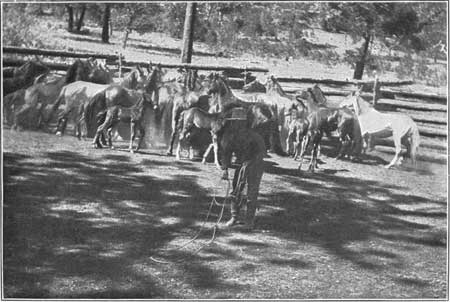|
The Use of the National Forests
|

|
FIRE.
The people have helped the Forest officers immensely in preventing and fighting fire. There are not half enough Rangers to suitably protect the Forests. The only way to keep fire down is for everyone to take a hand at it. Look out for small fires; they start big ones. See that camp fires are completely out before leaving them. Never burn brush or dangerous slashings in dry or windy weather. The time to fight fire is right at the start. When it once has a good headway it is often impossible to control it. As soon as fire is discovered put it out if you can, and in any case notify the nearest Forest officer at once and give him all the assistance possible.
Both State and Federal fire laws apply in National Forests. Persons who start fires intentionally or through carelessness will be most diligently followed up, arrested, and prosecuted to the full extent of the law. The penalties are severe.
IMPROVEMENT WORK.
Nothing will do more toward giving the National Forests the best kind of protection against fire, and nothing will help more to open up their resources for everybody's use than the construction of a great many well-built trails, roads, bridges, and telephone lines. Easy and quick communication to all parts of a Forest must be had if fire is to be kept down. The settlers, prospectors, miners, lumbermen, and stockmen profit directly from all work of this kind and can be of great assistance in pushing it through.

|
| Plate VI. Forest Ranger Roping His Saddle Horse. |
FOREST OFFICERS.
Most of the Forest officers in the National Forests are Supervisors, Rangers, or Guards.
The Supervisor has direct charge of a National Forest. He runs all the business upon it and is responsible for the work and the efficiency of the force under him. From training and experience he must be thoroughly familiar with western conditions. To do the work he must be sound in body, fit to endure a hard and rough outdoor life. He must be able to handle men well and deal wisely with all kinds of people. The business requires him to have a good working knowledge of timber and lumbering, the live-stock industry, the land laws, and ordinary office work. His position is a very responsible one, for he manages a public estate worth many millions of dollars. At present Supervisors are paid from $1,500 to $3,000 a year, and are reimbursed for actual living expenses when on field duty away from their headquarters.
The Rangers are the men who carry out the work on the ground. They are directly under the Supervisor. They must thoroughly know the country, its conditions, and its people. They live in the Forests, often in localities far from settlement and sources of supply. The Ranger must be able to take care of himself and his horses under very trying conditions; build trails and cabins; ride all day and all night; pack, shoot, and fight fire without losing his head. He must know a good deal about the timber of the country and how to estimate it; he must be familiar with lumbering and the sawmill business, the handling of live stock, mining, and the land laws. All this requires a very vigorous constitution. It means the hardest kind of physical work from beginning to end. It is not a job for those seeking health or light outdoor work. Rangers are now paid from $900 to $1,500 a year. They have to furnish and feed their own horses. The Government builds them cabins to live in and fences pastures to keep their stock in.
The duties of Guards are similar to those of Rangers, but they are usually temporary men on duty during the summer only, to assist in fire patrol and construction work. They are paid at the rate of from $720 to $900 a year.
MEN WANTED.
The National Forests need more men. While the present salaries are too low in many cases, they are constantly being increased as funds are available. For those who like a hard active life in the open the work is ideal. The kind of men wanted are those who will do the work because they like it and will stick to it with the intention of working up in the Service. The chances to go ahead are excellent.
Supervisors and Rangers are appointed only after civil service examinations. They must be residents of the State or Territory in which the National Forest is situated and between the ages of 21 and 40. The examinations are usually held once a year. They are very practical examinations. The life a man has led, what is his actual training and experience in rough outdoor work in the West, counts for more than anything else. Lumbermen, stockmen, cowboys, miners, and the like are the kind wanted. Forest Guards are appointed from those who have passed the ranger examination.
Information about the examinations can be obtained only from the Civil Service Commission, Washington, D. C.
Approved:
JAMES WILSON,
Secretary.
WASHINGTON, D. C., May 2, 1907.
| <<< Previous | <<< Contents>>> | Next >>> |
use_book_1907/sec6.htm
Last Updated: 02-Apr-2008